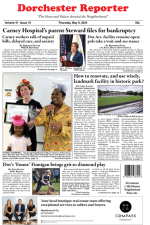August 21, 2017

UMass Boston’s Assistant Professor of Engineering, Kiersten “KC” Kerby-Patel
UMass Boston’s Assistant Professor of Engineering, Kiersten “KC” Kerby-Patel, will not only be bearing witness to Monday’s solar eclipse, she’ll also be recording it and measuring its impact. Kerby-Patel will be using the eclipse as a lab experiment, enlisting 150 citizen scientists as her lab partners.
Kerby-Patel and her collaborators, professors Jill Nelson and Laura Lukes of George Mason University, have come together to develop this crowdsourced experiment, calling it EclipseMob. EclipseMob will use inputs from observers across the country to monitor changes in the ionosphere, which is a layer of the earth’s atmosphere that is able to refract radio waves. Using the data they observe, the scientists can better understand how radio waves behave during ionospheric disturbances.
“The eclipse is a rare opportunity—it's a short-term disturbance to the ionosphere that is scheduled ahead of time,” Kerby-Patel said. “Usually it's very difficult to perform measurements of ionospheric disturbances because we don't know when and where they will occur.”
This is not the first time people have tried to crowdsource the measurements of a solar eclipse, with the most recent attempt being in 1925, but according to Kerby-Patel, participants have often failed to record vital time and date information.
With those deficiencies in mind, the EclipseMob team has developed a GPS-enabled EclipseMob smartphone app, that can record data and get accurate time and location information. To get the measurements for the app, EclipseMob has shipped 150 monitoring kits, which include antennas and receiver circuits that will measure the ionospheric activity, to citizen scientists in 31 states and two countries. The radio receivers that will be used in the kit were designed with the help of undergraduate students from UMass Boston’s engineering and computer science departments.
“This is the first solar eclipse that has happened in the continental United States since GPS was developed,” Kerby-Patel said. “With [EclipseMob], we are able to standardize a lot of things and we are able to get accurate time and location information so we can learn a lot about the geographic variation of how radio waves propagate during the eclipse.”
It’s taken Kerby-Patel and the EclipseMob team of observers months of preparations for them to be able to record the eclipse, but according to her, Monday evening will be the smoothest part of the entire process.
“By then everything will be easy. The hard part is right now where we are trying to make sure everything is ready. On the eclipse day I will be relaxing,” she said.



